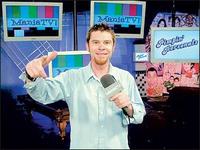
A few interesting articles yesterday from my favorite newspapers the Philadelphia Inquirer and The New York Times. The front page of the Inquirer featured an article about how broadband technology is changing the way people use the internet to include video footage and even online TV stations. They describe college students who get practically all of their content (news, entertainment, music, information) from the internet and internet only TV stations such as ManiaTV!. What really interested me was the ease that they claimed someone could broadcast, the interactiveness of some of the broadcasts, and the growth and makeup of the audience. I'd like to introduce a broadcast component to my Journalism 2 class and maybe this is a different and less time consuming way to do it.
There was also this column about the textbook the Philadelphia School district will be using for it's new mandatory African American History course. This topic is a favorite of mine and is important in the interdisciplinary American Studies course I team teach. One of the problems I've found in teaching African American history to mostly white students is they have a hard time understanding the impact of our history on the present. They seem to think that racism and discrimination were in the South and the past and if there is any discrimination today it's against whites. The African-American Odyssey is a college textbook being re-written for tenth graders and seems to do a nice job clearing up some popular misconceptions. The article even includes a quiz (derived from the book) with some surprising answers (I only got 7 out of 10 correct). Did you know that as of 1830 there were over 2,000 slaves in New Jersey?
The New York Times also had a useful article to help get through to these kids. It is a study from Penn State that used DNA evidence that showed how most of us are of mixed races. Too bad we couldn't start the school by letting each kid discover his or her true racial makeup. I'm sure it would engage some students in African American history in new ways.
Finally, there was this story in the New York Times that questions the usefulness of college education programs. It claims that "for decades, education schools have gravitated from the practical side of teaching, seduced by large ideas like 'building a caring learning community and culture" and "advocating for social justice.'" It calls for education programs to become more focused on what goes on in the classroom believing that will help reduce the large number of teachers who leave the profession in the first few years. But while I acknowledge that there might need to be a better balance between the practical and the theoretical, I don't think too much of a swing would be helpful. Teachers need to be aware of the big picture in education beyond their content material and how to prepare for standardized tests. Knowing the history and scope of education and the various theories supporting it, creates reflective teachers that work to engage students in the content in new and more exciting ways. I'm glad that I took a mix of education and English content courses in graduate school. Many of those education courses made me rethink what I do in the classroom and why I do it.
No comments:
Post a Comment